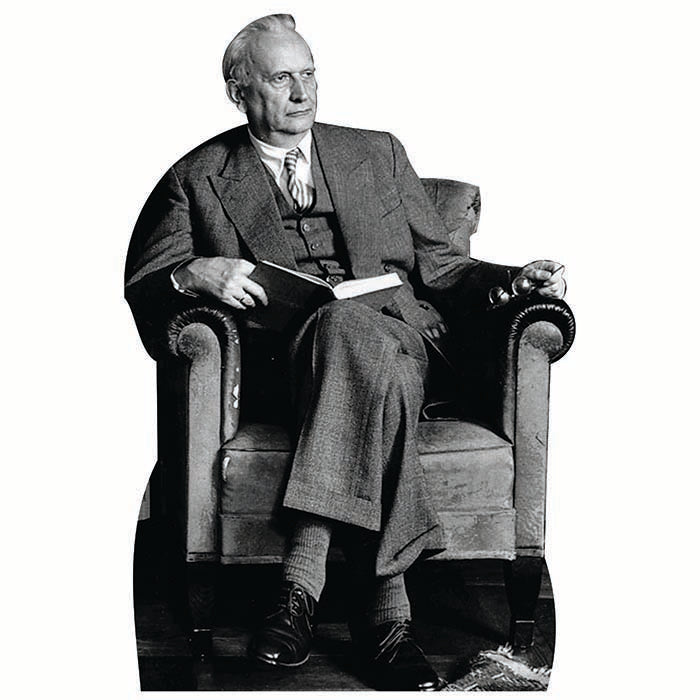Introduction to Karl Jaspers
Celebrate the legacy of one of the most influential existentialist philosophers with our lifesize cardboard cutout of Karl Jaspers. Perfect for philosophical displays, educational events, or as an inspiring addition to your home or office, this cutout captures the profound and thoughtful presence of Karl Jaspers, reflecting his significant impact on philosophy and culture.
Background of Karl Jaspers
Karl Theodor Jaspers was born on February 23, 1883, in Oldenburg, Germany. Initially pursuing a career in medicine, Jaspers studied at the University of Heidelberg, where he specialized in psychiatry. He earned his medical degree in 1909 and soon became interested in the philosophical aspects of psychiatric conditions, leading to his seminal work "General Psychopathology" (1913). This work laid the foundation for his transition from medicine to philosophy.
Jaspers' philosophical career began to take shape when he joined the faculty of the University of Heidelberg as a professor of psychology. In 1921, he published "Psychology of Worldviews," where he explored the intersection of psychology and philosophy, emphasizing the importance of individual perspective and experience.
In the 1930s, Jaspers' focus shifted more towards existential philosophy. He published "Philosophy" in 1932, a comprehensive three-volume work that established him as a leading existentialist thinker. Jaspers' existentialism centered on the idea of "boundary situations," moments of crisis that force individuals to confront their existence and seek authentic meaning.
Despite his academic success, Jaspers faced significant challenges during the Nazi regime due to his opposition to their ideology and his wife’s Jewish heritage. He was dismissed from his teaching position in 1937 and faced increasing persecution. After World War II, Jaspers resumed his academic career and continued to write prolifically.
Jaspers' later works include "The Question of German Guilt" (1946), where he addressed the moral responsibility of German citizens for the atrocities of the Nazi regime, and "The Origin and Goal of History" (1949), which examined the philosophical implications of historical development.
Throughout his life, Jaspers emphasized the importance of communication and dialogue in the pursuit of truth. His philosophy was marked by a commitment to transcendental ideas and the exploration of the human condition. Jaspers continued to write and lecture until his death on February 26, 1969, in Basel, Switzerland.
Cultural Impact of Karl Jaspers
Karl Jaspers' impact on philosophy and culture is profound and enduring. As a central figure in existentialist thought, his work has influenced a wide range of disciplines, including psychology, theology, and political theory.
Jaspers' concept of "boundary situations" has been particularly influential. These moments of existential crisis, such as death, suffering, and guilt, challenge individuals to confront the limitations of their existence and seek deeper meaning. This idea has resonated with existentialist thinkers and has been explored in literature, psychology, and the arts.
His work "General Psychopathology" remains a foundational text in the field of psychiatry, bridging the gap between medical and philosophical approaches to mental health. Jaspers' emphasis on understanding patients' subjective experiences has influenced contemporary psychiatric practice and the humanistic approach to psychology.
Jaspers' exploration of the "Axial Age" in "The Origin and Goal of History" introduced the idea of a pivotal period in human history where major philosophical and religious traditions emerged independently across different cultures. This concept has shaped historical and cultural studies, emphasizing the interconnectedness of human thought and the development of global civilization.
In "The Question of German Guilt," Jaspers addressed the collective responsibility of the German people for the Holocaust, promoting a moral reckoning and the importance of ethical reflection in post-war Germany. His work contributed to the broader discourse on guilt, responsibility, and the moral implications of political actions, influencing subsequent debates on these issues.
Jaspers' commitment to dialogue and communication as essential components of philosophical inquiry has had a lasting impact on modern philosophy. His emphasis on the importance of open, honest discourse in the pursuit of truth continues to resonate in contemporary discussions on ethics, politics, and human rights.
This cutout of Karl Jaspers celebrates his remarkable contributions and enduring legacy as a master philosopher and thinker. It serves as a tribute to his intellectual brilliance, his impact on the development of existential philosophy, and his significant role in shaping the cultural and intellectual heritage of the 20th century.

LIFE SIZE HISTORICAL CUTOUTS
We have been the leading historical based cutout supplier for nearly 10 years. We have worked with many schools, museums, and colleges across the country to provide stunning graphics from history. Historical Cutouts are available in 3 materials and come contour cut with an easel to be self standing. Click below to learn more about each material and our cutout process.

LIFE SIZE HISTORICAL WALL DECALS
All of our historical figures are available as a life size wall decals. Vinyl wall decal orders come ready to apply with squeegee and instructions. Having trouble? Check out our how-to YouTube video. Our graphics are printed on tear resistant PhotoTex Vinyl using our high definition 4-color plus white printing process.

HISTORICAL ACRYLIC CUTOUTS
Desktop Legends are a smaller version of our life size cutouts printed on 3/16" acrylic. All of our historical cutouts are also available as a desktop legend. These acrylic statuettes come in two sizes, 8" and 12". If you would like to learn more please click below.















